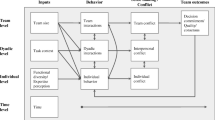Abstract
Some of the most difficult conflicts of all are those grounded in identity, which can be analyzed in both personal and societal contexts. The author's goal is to conceptualize identity-based conflict from a systems perspective. He uses ideas from psychology, social psychology, and organization theory, connecting them to concepts of “cybernetic control.” As is the case with Social Identity Theory, a major challenge for the negotiation field is to provide a better understanding of destructive forms of intergroup behavior and how belief systems allow group members to justify bad treatment of outgroup members.
Similar content being viewed by others
REFERENCES
Albert, S., B.E. Ashforth, and J.E. Dutton. 2000. Organizational identity and identification: Charting new waters and building bridges. Academy of Management Review 25(1): 13-17.
Argyris, C. 1985. Strategy, change, and defensive routines. Boston: Pitman.
Argyris C. A and D.A. Schon. 1978. Organizational learning. Reading, Mass.: Addison-Wesley.
Bandura, A. 1977. Self-efficacy: Towards a unifying theory of behavior change. Psychological Review 84: 191-215
Baumeister, R. 1999. The self in social psychology. Philadelphia: Taylor & Francis.
Blanz, M., A. Mummendey, R Mielke, and A. Klink. 1998. Responding to negative social identity: A taxonomy of identity management strategies. European Journal of Social Psychology 28: 697-729.
Bobrow, D.G. and D.A. Norman. 1975. Some principles of memory schemata. In Representation and understanding: Studies in cognitive science, edited by D.G. Bobrow and A. Collins. New York: Academic Press.
Bohm, D. 1989. On dialogue. Transcription of a meeting in Ojai, California.
Brown, R. 2000. Agenda 2000: Social identity theory: Past achievements, current problems and future challenges. European Journal of Social Psychology 30: 6.
Dawes, R.M. 1980. Social dilemmas. American Review of Psychology 31: 169-193.
Erez, M. and P.C. Earley. 1993. Culture, self-identity, and work. New York. Oxford University Press.
Gibb, J.R. 1965. Defensive communication. ETC: A Review of General Semantics 22: 2.
Greenberg, J., S. Solomom, T. Pyszcznski, A. Rosenblatt, J. Burling, D. Lyon, L. Simon, and E. Pinel. 1999. Why do people need self-esteem? Converging evidence that self-esteem serves an anxiety-buffering function. In The self in social psychology, edited by R. Baumeister. Philadelphia. Taylor & Francis.
Hardin, R.G. 1968. The tragedy of the commons. Science 162: 1243-1248
Hicks, T. 2001. Another look at identity-based conflict: The roots of conflict in the psychology of consciousness. Negotiation Journal 17(1): 35-46.
Kelman, H.C. 1997. Negotiating national identity and self-determination in ethnic conflicts: The choice between pluralism and ethnic cleansing. Negotiation Journal 13(4): 327-341.
Lazos, S. 1999. Judicial review of initiatives and referendums in which majorities vote on minorities democratic citizenship. Ohio State Law Journal 60(2): 399-555.
MacDonald, M. 1990. The dominant communities and the cost of legitimacy. In The elusive search for peace: South Africa, Israel, Northern Ireland, edited by H. Giliomee and J. Gagiano. Oxford: Oxford University Press.
Mitchell, G. 1999. Making peace: The inside story of the making of the Good Friday Agreement. London. Heinemann.
Morgan, G. 1997. Images of organization. Thousand Oaks, Calif.: Sage.
Pemberton, W.H. 1983. The dynamics and prevention of human self-destruct: The application of therapeutic intervention. In Conflict resolution technology, edited by D.W. Cole. Cleveland: Organization Development Institute.
Rabbie, J.M. and M. Horowitz. 1969. Arousal of ingroup-outgroup bias by a chance win or loss. Journal of Personality and Social Psychology 13: 269-77.
Rapoport, A. 1974. Conflict in man-made environment. Harmondsworth, U.K.: Penguin.
Robinson, R.J., D. Keltner, A. Ward, and L. Ross. 1995. Actual versus assumed differences in construal: Naive realism in intergroup perception and conflict. Journal of Personality and Social Psychology 68(3): 404-417.
Rosen, R. 1994. Quoted in: J.L. Casti, Complexification: Explaining a paradoxical world through the science of surprise. New York: Harper-Collins.
Senge, P.M. 1990. The fifth discipline: The art and practice of the learning organization. New York: Doubleday.
Smyth, L.F. 1994. Intractable conflicts and the role of identity. Negotiation Journal 10(4): 311-322.
Tajfel, H., ed. 1978. Differentiation between social groups: Studies in the social psychology of intergroup relations. London: Academic Press.
Tajfel, H. and J.C. Turner. 1979. An integrative theory of intergroup conflict. In The social psychology of intergroup relations, edited by W.C. Austin and S. Worchel. Monterey, Calif.: BrooksCole.
Thomas, K.W. 1976. Conflict and conflict management. In Handbook of industrial and organizational psychology, edited by M.D. Dunnette. Chicago: Rand McNally.
Thompson, L and G. Loewenstein. 1992. Egocentric interpretations of fairness and interpersonal conflict. Organizational Behavior and Human Decision Precesses. 51: 176-197.
Wade-Benzoni, K.A., A.E. Tenbrunsel, and M.H. Bazerman. 1997. Egocentric interpretations of fairness as an obstacle to the resolution of environmental conflict. In Research on negotiation in organizations, edited by R.J. Lewicki, R.J. Bies, and B.H. Sheppard. London: JAI Press.
Weick, K.E. 1969. The social psychology of organizing. Reading, Mass.: Addison-Wesley.
Author information
Authors and Affiliations
About this article
Cite this article
Smyth, L.F. Identity-Based Conflicts: A Systemic Approach Evaluation Project. Negotiation Journal 18, 147–161 (2002). https://doi.org/10.1023/A:1016196519460
Issue Date:
DOI: https://doi.org/10.1023/A:1016196519460




